Rizogalo, pronounced “ri-ZOH-ga-loh” is a Greek rice pudding, from rizo meaning rice and gála meaning milk. Delicately flavored with orange and cinnamon, rizogalo is luxuriously creamy, delightfully fragrant, and refreshingly light. It’s a naturally gluten-free dessert (or breakfast) recipe everyone will enjoy!
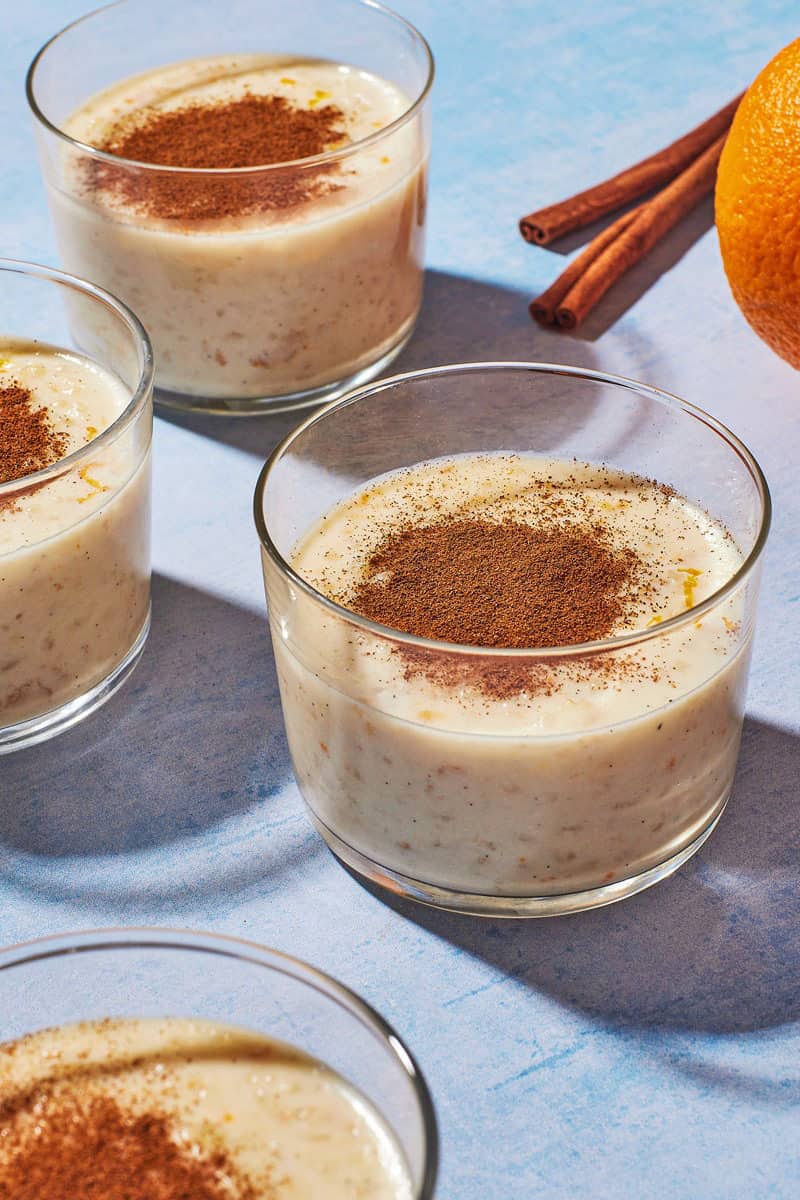
It seems most every culture has their version of rice pudding, from Middle Eastern-style rice pudding that’s sometimes flavored with rose water, to Indian kheer scented with cardamom and saffron, to Sicilian Strawberry Pudding, to French riz au lait that’s often finished with heavy whipping cream.
Rizogalo is Greece’s version of the classic dessert recipe. Like many Greek dishes, it uses humble ingredients to make something truly exceptional. With no cream, eggs, butter, or condensed milk, rizogalo is a healthy and delicious gluten-free rice pudding you’ll want to eat all year long!
Enjoy it hot or cold, for breakfast, as a snack, or as an after-dinner dessert.
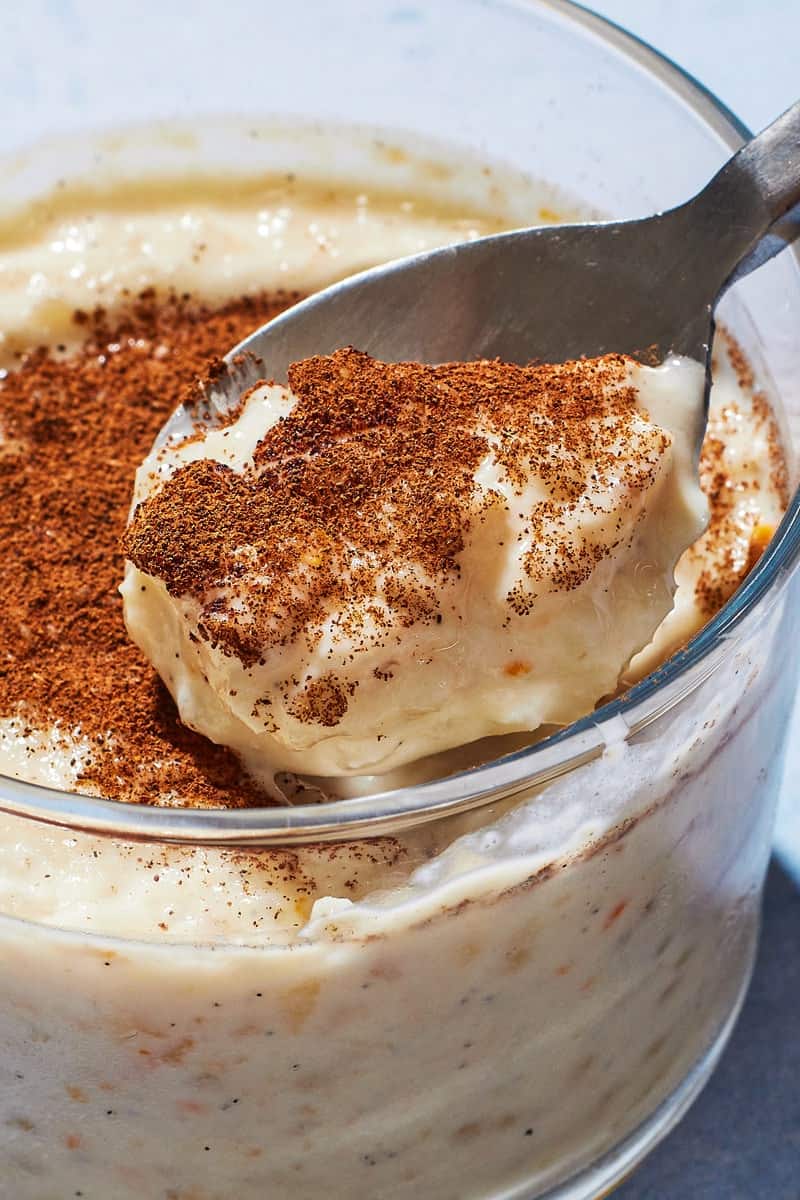
Food Stories: A Bowl of Nostalgia and Comfort!
Every Greek person has a memory of enjoying rizogalo as a child. The distinct smell of milk simmering over the stove, together with the citrus, vanilla, and cinnamon, would fill our kitchen with the most delightful aroma.
To this day, every time I see rizogalo, or when I make it in my home, it evokes a warm, cozy, and comforting feeling like a hug of a mother to her child. It was a delight for my mum to stand whisking the pot joyfully, knowing her children enjoyed the dish so much. So much so I was always eager to scrape and eat what remained in the pot before Mum would wash it.
As I reflect and write this, I am concluding my last few days in Greece, where I have spent five weeks road tripping around photographing and eating through this beautiful country. I have tried many old and new foods, but the one dish that was offered everywhere I went was rizogalo.
Whether I was starting my day in hotel breakfast rooms or at a local bakery, I always found small earthenware pots of rizogalo front and center. I didn’t need to guess what type of rice pudding it was or whether the recipe had changed from that of my mother. The cinnamon sprinkled over the top and the honey pot on the side told me what I already knew: this is Greek rizogalo.
The warmth and comfort those earthenware pots brought me every morning was no surprise. We all crave nostalgia and comfort at any age.
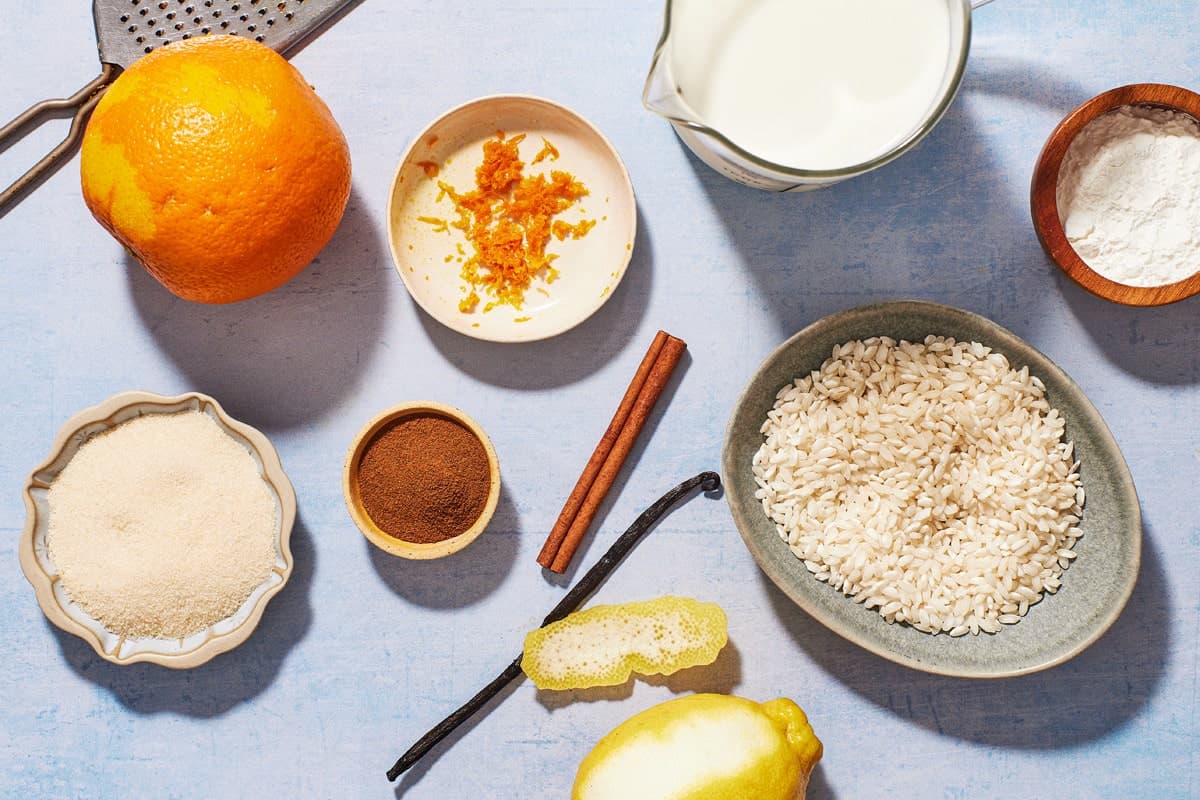
Rizogalo (Greek Rice Pudding) Ingredients
Rizogalo is made with very few ingredients that you most probably have in your pantry and fridge. You’ll need:
- Milk: Rizogalo is traditionally made using whole milk. This milk ensures you get a creamy, full-bodied rice pudding. Other light or nut milk can be used, but they will have different taste and texture (see “Let’s Talk Rice and Milk” below).
- Rice: I use uncooked risotto or arborio, a short-grain rice. Due to the high starch content (amylopectin) in this variety of rice, the pudding remains creamy. Do not rinse the uncooked rice; it removes much of the starch necessary to achieve the pudding’s distinct texture.
- Vanilla: I like to use the seeds of a vanilla bean for its intense flavor and for the visually appealing black specks that permeate the pudding. However, one teaspoon of vanilla paste or extract can be substituted.
- Lemon and orange: Flavoring the rice pudding with citrus is optional, though I highly recommend it. Adding the lemon and orange gives a lovely freshness and slight sweetness that works wonderfully with the milk, vanilla, and cinnamon. I added the citrus in two ways: a piece of lemon peel, which I remove once the pudding is cooked, and the zest of one-quarter of an orange.
- Cornstarch: A gluten-free product made from pure ground corn kernels. It is neutral in flavor and is added as a thickener in this recipe.
- Sugar: I like a small amount of superfine sugar, but you can use standard cane sugar as long as you stir well while the mixture is still warm. If you like it sweeter, add one more tablespoon. Also, a drizzle of honey can be served over the top, adding sweetness.
- Cinnamon: Rizogalo would not be a Greek recipe if it were not for the cinnamon–you’ll see the warming spice in many traditional Greek desserts, like Loukoumades and Baklava. This is by far the Greek finale to a Greek pudding. Both a whole cinnamon stick and ground cinnamon are used in this recipe, adding unique warmness and spice to the pudding.
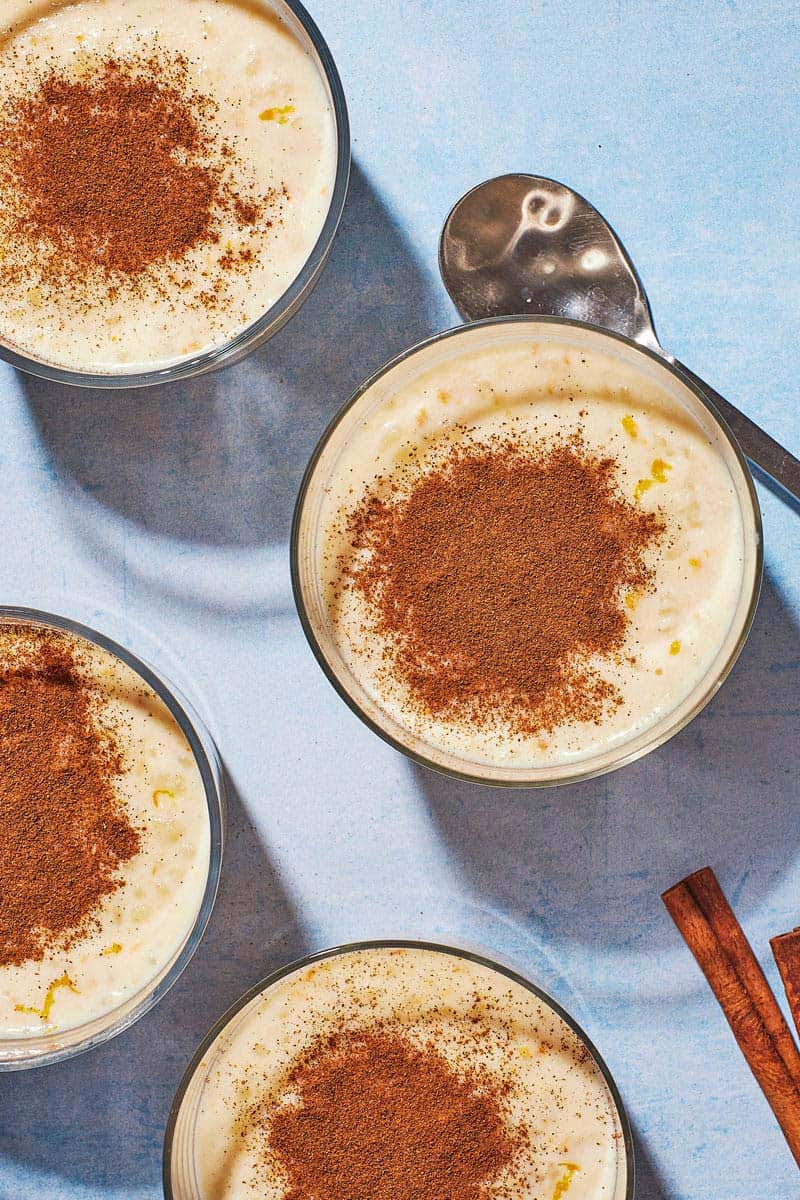
How to Make Rizogalo Greek Rice Pudding
This Greek rice pudding recipe is simple to make and always gluten-free. The goal is fluffy pudding, and the secret is your kitchen whisk. Whisk the milk often to incorporate air, which will not only prevent sticking but also make a deliciously light rice pudding.
- Season the milk. In a medium saucepan, add 4 1/4 cups milk, 1/2 cup Arborio rice, 1 cinnamon stick, a 2-inch strip of lemon rind, and the zest from 1/4 orange. Use a small knife to split the vanilla pod in half lengthwise, then scrape the seeds into the pan and discard the pod (wait until later if you’re using vanilla extract).
- Bring to a simmer. Bring the mixture to a simmer over low to medium heat, whisking continuously for the first 3 minutes so that the milk and rice do not stick to the bottom of the pot.
- Cook rice. Continue to cook rice, whisking vigorously every six or so minutes and until the rice is very tender and the mixture has started to thicken. This should take about 35-40 minutes. To check if the rice is cooked, taste a rice grain. It should be very soft. The consistency of the milk should be thick like heavy cream.
- Thicken. Dilute 1 tablespoon of cornstarch with 1/4 cup of water in a small bowl. Pour into the rice mixture over low heat, whisking until combined and the pudding has thickened yet is slightly pourable in consistency. This will happen quickly, so keep an eye on it. Remove from heat. It will continue to thicken slightly while it cools, so do not make it too thick.
- Finish. Remove and discard the lemon rind and cinnamon stick. Stir in 1 teaspoon vanilla extract and sweeten to taste (I like about 2 tablespoons of sugar to start).
- Serve. Pour the pudding into 5 serving bowls and liberally sprinkle with cinnamon powder.
Let’s Talk Rice and Milk
At the heart of Greek rice pudding–or any rice pudding for that matter–is the rice and the milk. The correct ratio of milk and rice is very important. Not paying attention can result in a far too thick pudding reminiscent of risotto. Too little rice can become more like a rice soup. Neither is pleasant when expecting a delicious light and fluffy rice pudding.
What Milk Makes the Best Pudding?
Let me say this: whole milk is best for authentic rizogalo. Like all things, traditional recipes are traditional because they remain fundamentally the same at the core.
Milk comprises three things, milk, water, and protein. When milk is whisked, it breaks up the fat and protein molecules which allows the liquid to absorb air. The air bubbles formed are small, which gives milk its creamy texture. This is why low-fat milk is not as ideal. The less fat in the milk, the less creamy the result.
Nevertheless, choosing other milk options will work but taste slightly different and have a different texture. I’m not saying that’s a bad thing, but it’s just not a traditional Greek rizogalo. Rather, it’s another version of rice pudding.
Can a non-dairy product substitute milk? Can low-fat (half and half), lactose-free, skinny, almond, soy, oat, and coconut milk work?
- Low-fat, half-and-half, lactose-free milk or non-dairy varieties will not taste as creamy or full-bodied as whole milk.
- Nut or coconut milk will taste distinctly of that milk variety.
- Condensed and evaporated milk is far richer and sweeter and not the ideal milk to use to cook the rice.
Using whole milk also means you do not need to add eggs, butter, or cream. You don’t need to worry about tempering eggs or be worried about the extra fat component from these ingredients. When cooking with whole milk make sure it doesn’t stick to the bottom of the pot. Whisking regularly helps avoid this.
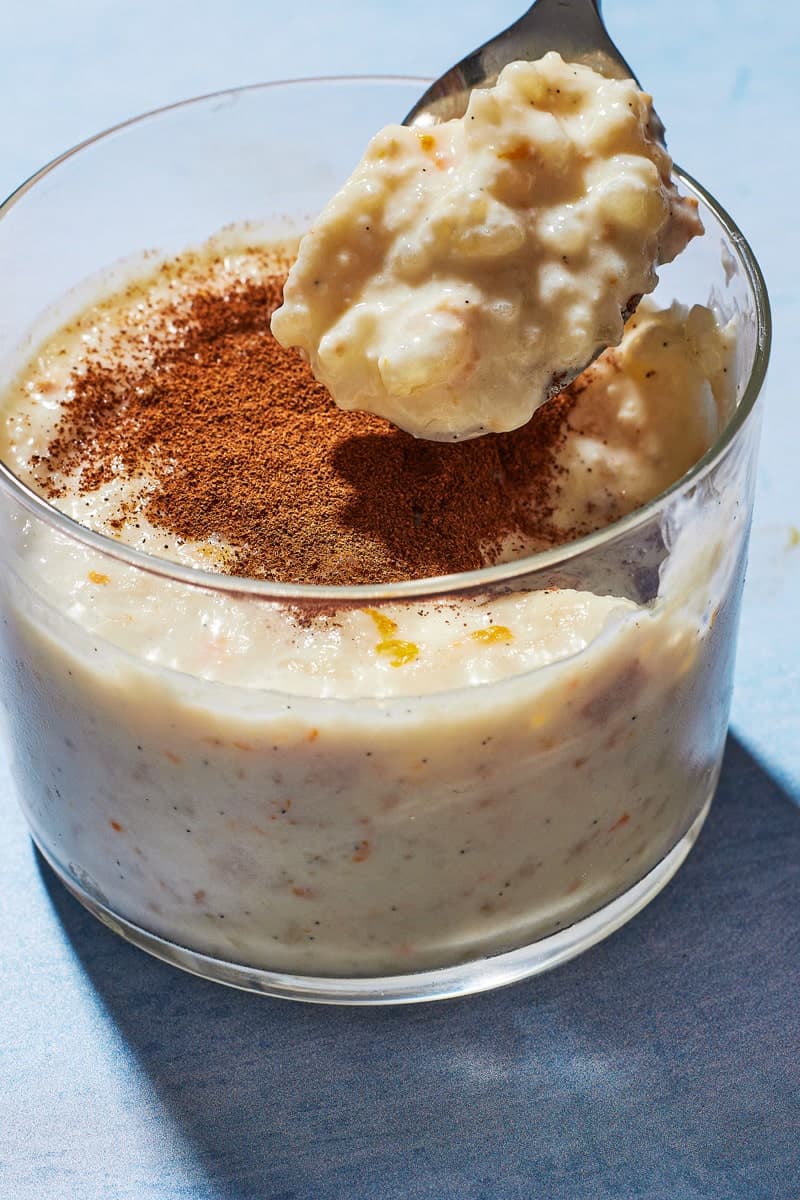
What is the Best Rice for Rice Pudding?
For the best result, use uncooked risotto or arborio short-grain rice. This type of rice has a high content of starch (amylopectin) which gives the pudding its creamy texture when cooked.
The ideal texture comes from whisking uncooked rice on low heat so that it releases starch, cooks through, and thickens the milk.
Do not rinse the uncooked rice, as it removes much of the starch necessary to achieve the thick consistency that makes this pudding distinct. Please note this is not a sticky rice pudding. This is more like a fluffy custard pudding, with rice which is light and flavorful.
There are many varieties of rice but not all are interchangeable. You can use cooked rice, but you won’t achieve the same result and brown rice is not ideal as it absorbs far too much liquid.
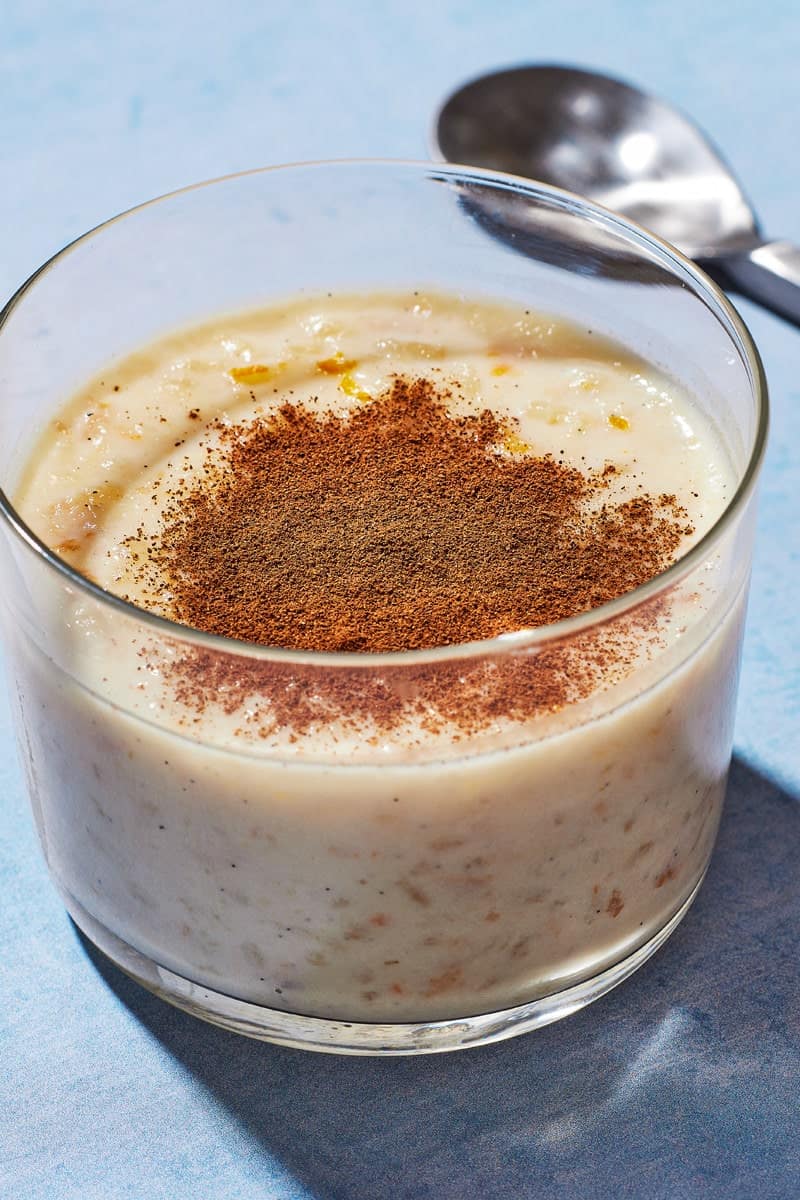
Should I Whisk or Stir Rice Pudding?
Whisking rather than stirring throughout the cooking process creates a light, airy, and fluffy rizogalo because it aerates the milk. Trust me on this one, no one enjoys the heavy, thick, and stodgy pudding! Use any whisk you have on hand.
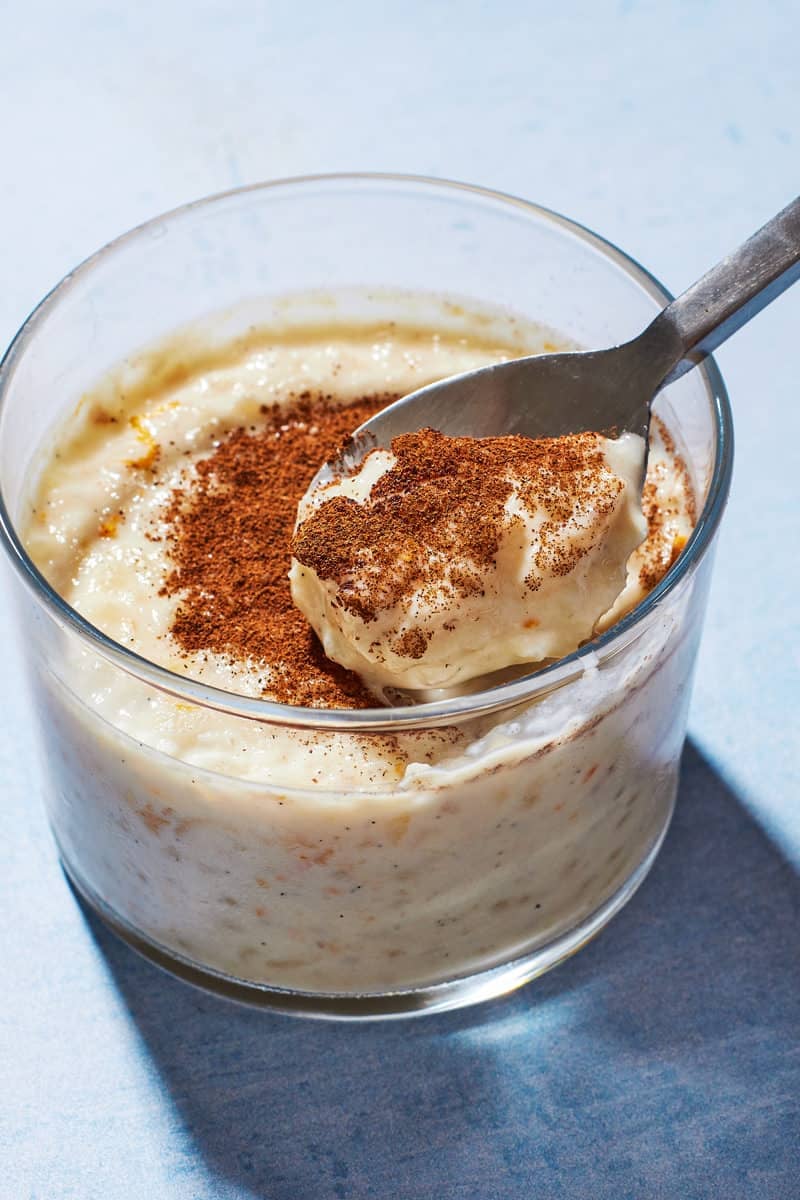
What to Serve with Rizogalo
This Greek rice pudding is both filling and satisfying! Enjoy this for breakfast, as an afternoon snack, or for a lovely Gluten-Free dessert. Serve rizogalo after a delicious Greek-style dinner, such as Roast Spatchcock Chicken with Citrus & Honey or Pan Seared Shrimp with Lemon-Garlic Braised Greens.
Top it with fresh fruit, Quick Berry Compote, or a spoonful of Greek Fig Jam or Orange Jam. A simple way to add a little extra sweetness is to finish the pudding with a drizzle of Greek honey.
If you have extra oranges around the house, make candied orange peels or another beloved Greek recipe called, Portokalopita aka Greek Orange Cake. It’s a custard cake made with phyllo and orange honey syrup.
More Greek Dessert Recipes to Try
Browse all Mediterranean Recipes.
Visit Our Shop.
Greek Honey – Thyme, Forest & Wild Herbs
A drizzle of this high quality honey adds the perfect finishing touch to your Greek rice pudding.

Rizogalo (Greek Rice Pudding)

Ingredients
- 4 1/4 cups (1 liter) whole milk
- 1/2 cup Arborio rice, uncooked and unrinsed
- 1 cinnamon stick
- 1 vanilla bean or 1 teaspoon vanilla extract
- 1 2-inch strip lemon rind
- Zest of 1/4 orange
- 1 tablespoon cornstarch
- 2 tablespoons sugar
- Ground cinnamon, for garnish
Instructions
- Season the milk. In a medium saucepan, add the milk, rice, cinnamon stick, lemon rind, and orange zest. Use a small knife to split the vanilla pod in half lengthwise then scrape the seeds into the pan and discard the pod (if you are using vanilla extract, wait to add it until later).
- Bring to a simmer. Bring the mixture to a simmer over low to medium heat, whisking continuously for the first 3 minutes so that the milk and rice do not stick to the bottom of the pot.
- Cook the rice. Continue to cook rice, whisking vigorously every six or so minutes and until the rice is very tender and the mixture has started to thicken. This should take about 35-40 minutes. To check if the rice is cooked, taste a rice grain. It should be very soft. The consistency of the milk should be thick like heavy cream.
- Thicken. Dilute the cornstarch with 1/4 cup of water in a small bowl. Pour into the rice mixture over low heat, whisking until combined and the pudding has thickened yet is slightly pourable in consistency. This will happen quickly, so keep an eye on it. Remove from heat. It will continue to thicken slightly while it cools, so do not make it too thick.
- Finish. Remove and discard the lemon rind and cinnamon stick. Stir in 1 teaspoon vanilla extract (if using) and sweeten to taste (I like about 2 tablespoons of sugar to start).
- Serve. Pour the pudding into 5 serving bowls and liberally sprinkle with ground cinnamon. It can be enjoyed, warm, at room temperature or cold.
Notes
- Do not rinse the uncooked rice; it removes much of the starch necessary to achieve the pudding’s distinct texture.
- Swaps & Subs:
- Use honey instead of sugar. Add 1-2 tablespoons and mix thoroughly. Taste and adjust as desired.
- Omit the lemon and orange rind and just flavor with the vanilla.
- Replace the cinnamon stick with cardamom pods for a slightly peppery kick.
- Traditional topping is cinnamon powder but feel free to add any nuts, berry compote, strawberry compote, fresh fruit, jam or runny honey as an alternative.
- Storage. If the rizogalo is not eaten within 2 hours of making, just cover with cling film and refrigerate to avoid any skin forming on the top. It should be consumed within two days. Do not reheat. Eat directly from the refrigerator.
- Visit our shop to browse quality Mediterranean ingredients including olive oils, honey, jams, and spices.

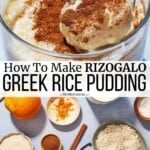
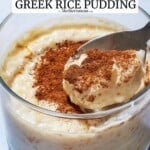
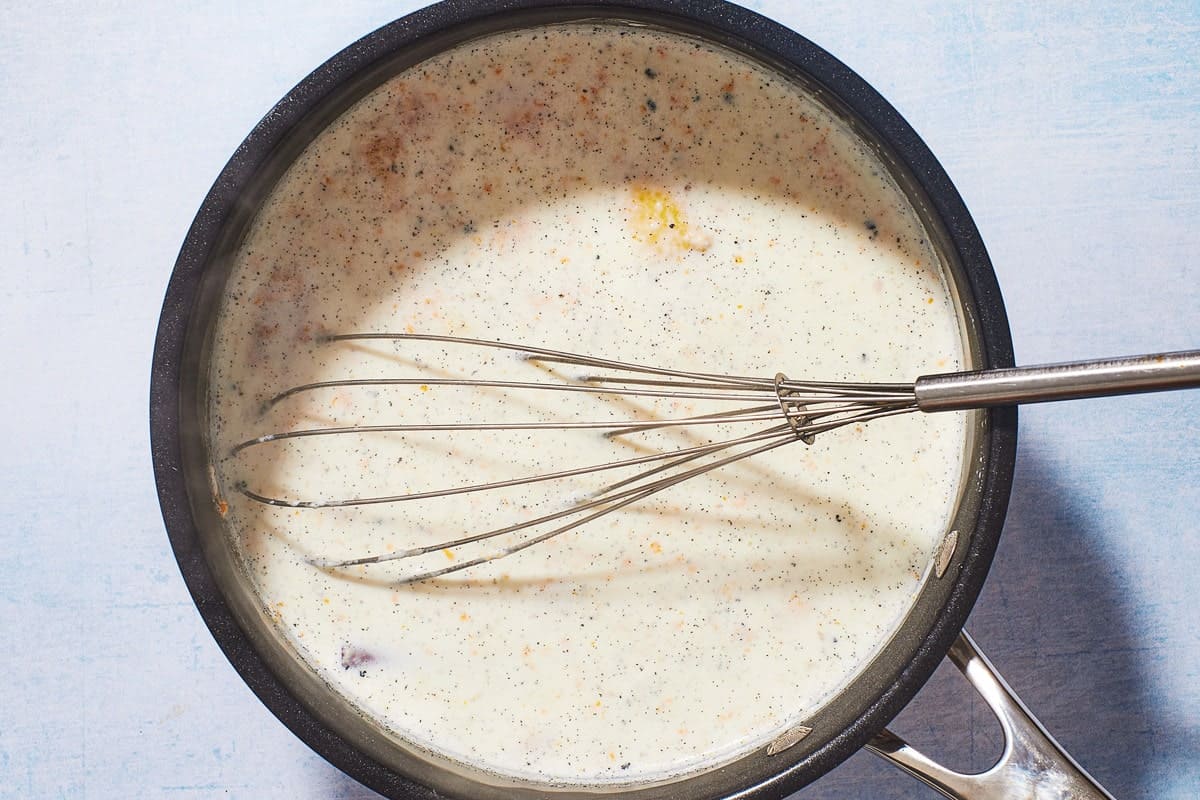
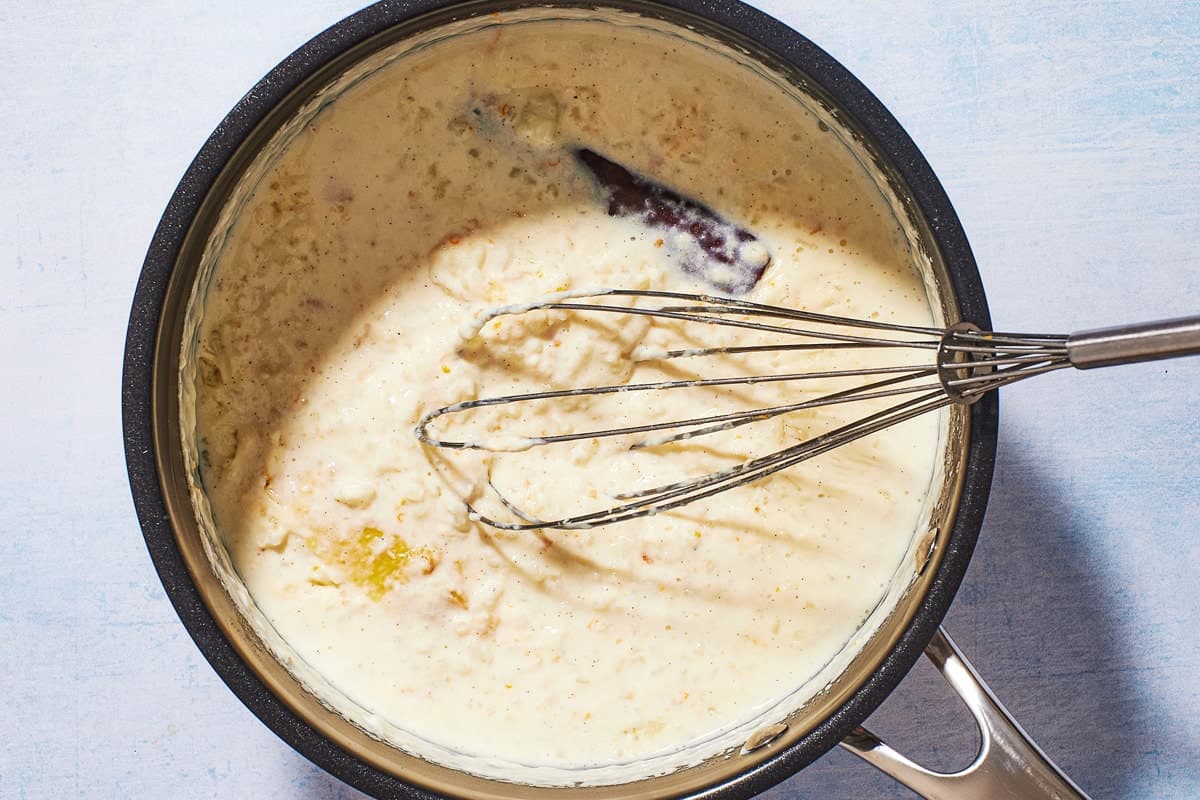
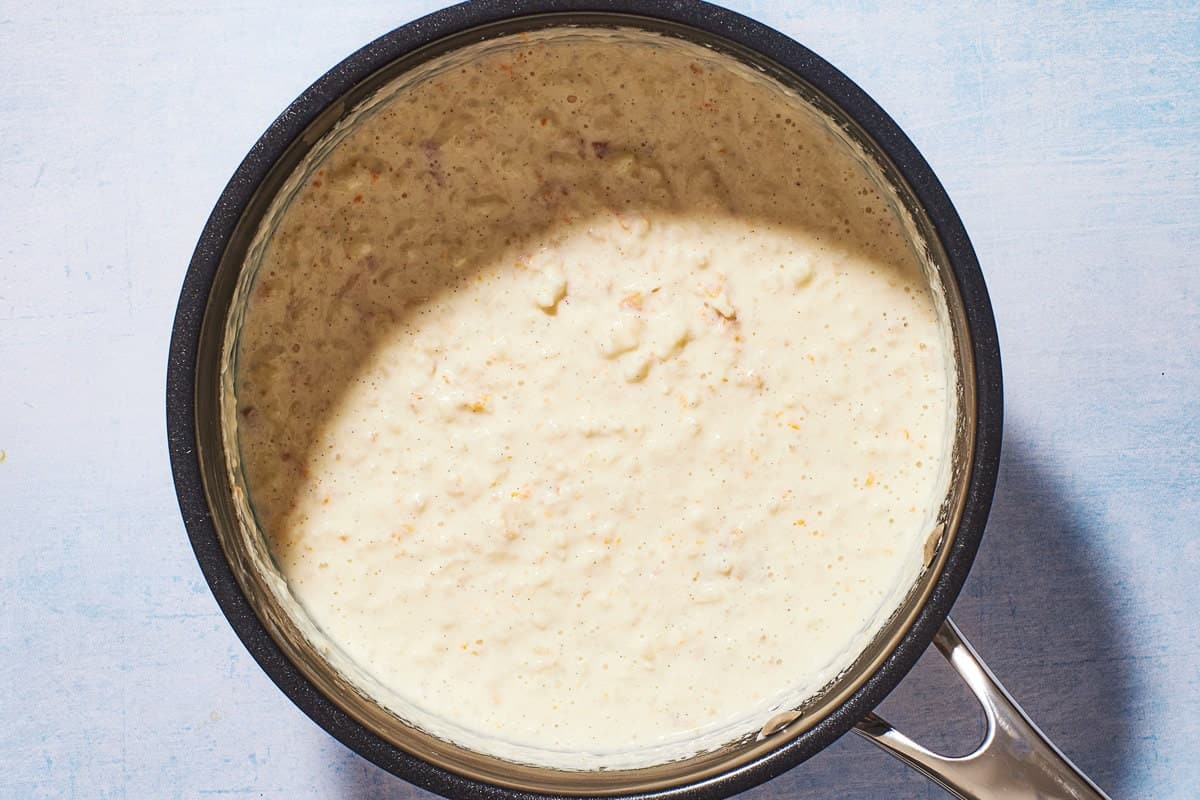
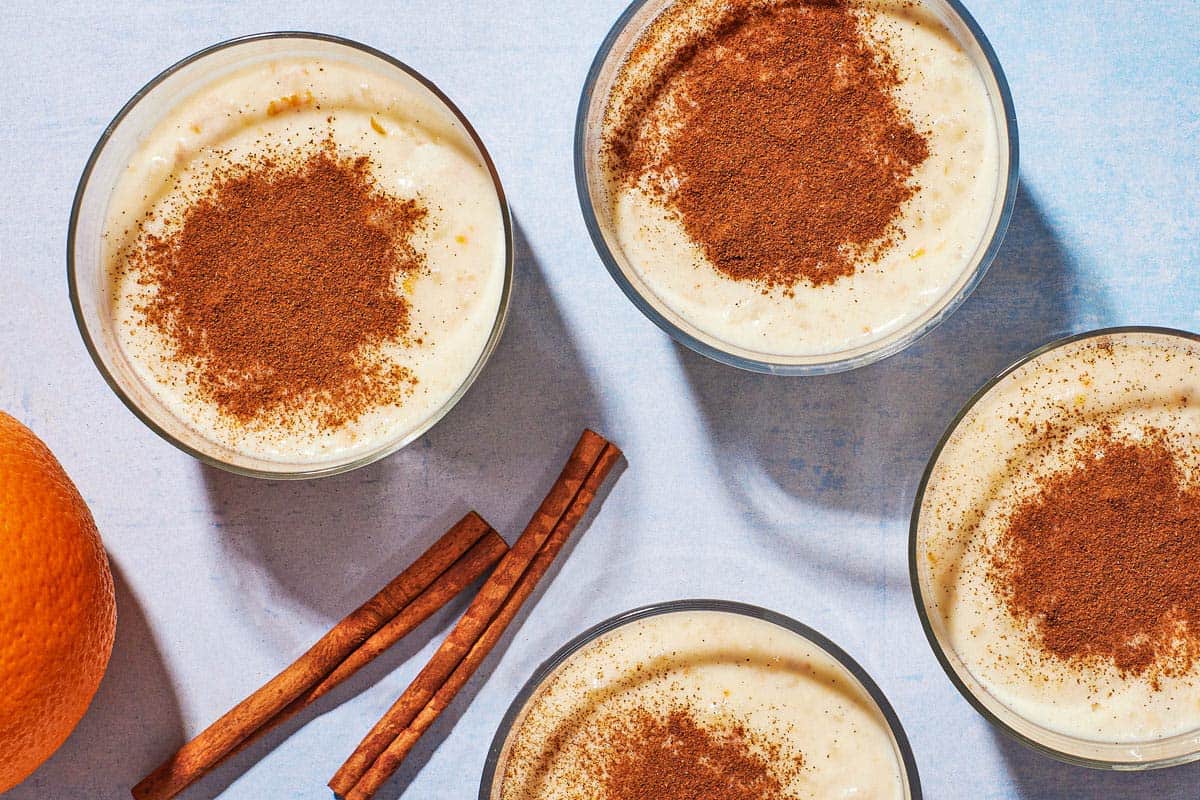
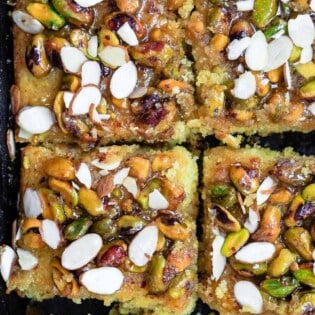

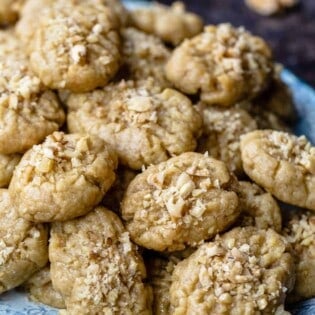

This recipe is so Good! I made it for my parents this weekend and they thought it was fabulous. thank you so much Ruth for your wonderful inspirational Lifestyle!
– Jakin ( Age 8)
Thank you so much, Jakin! Glad you enjoyed this one! Can’t wait to hear what you make next!
Hi – when I choose the 2x or 3x quantity options button some of the measurements don’t change from the 1X option:
for milk, the 1 liter amount stays at 1 liter no matter which button is clicked.
Zest of 1/4 orange stays as 1/4 orange on all 3 buttons
The option for 1 teaspoon vanilla extract stays as 1 teaspoon on all 3 buttons.
Thanks and making this today
Hi, Steve. I’m so sorry about that. It’s a glitch in the scaling up program, unfortunately. When scaling up this recipe, you’re going to want to increase all of the ingredient amounts accordingly.
She says if using vanilla extract to wait to add it later but doesn’t tell us when later. Great proof reading!
Sorry about that, Marina. It is explained in the article itself: Finish- Remove and discard the lemon rind and cinnamon stick. Stir in 1 teaspoon vanilla extract and sweeten to taste (I like about 2 tablespoons of sugar to start). I see it’s not on the recipe card, though, so I’ll add that. Thanks for your feedback.
Was fresh out of citrus and cinnamon sticks and it is still delicious!
Great to know the recipe works without those things in a pinch!!
Cooked this today using coconut milk. Topped with cinnamon and fresh, ripe mango. Absolutely delicious!
So glad you loved it, Marcia!!
Creamy and tasty
First attempt and it is wonderful. Love it
I don’t ever leave comments but this is to die for!! Definitely worth the time to make it and it won’t be my last time making it. Everything I have made on this web site has been absolutely delicious. Thank you!
You are so sweet, Leah! Thank YOU!
I swear I followed the recipe exactly as instructed…whole milk, Arborio, cornstarch & water etc but I ended up with thick soup. What could I have done wrong?
Hi, Jackie. Without being there, it’s very hard to say what might have gone wrong for you. Usually, when this happens, it means you needed to cook the pudding a bit longer.
Very eager to make this for Easter dessert. If using vanilla extract, at what point should it be added?
Hi, Jackie. You’ll want to add that after you remove and discard the lemon rind. Enjoy!
Hi Suzy,
I made this and your roasted chicken last night for dinner. Both were amazing!!
Rice pudding has always been one of my favorite desserts, and I was intrigued by the small amount of sugar this recipe calls for. I’ve never put orange and lemon zest in my rice pudding, but between the zests, cinnamon stick and vanilla bean, this is rice pudding perfection!!
Thank you once again for a delicious recipe (the roasted chicken was scrumptious too)!
So glad you liked the rice pudding and the chicken! Thank you so much for taking the time to leave a comment. It really means the world to the whole team.
Would love to make this using the same ratio of rice to milk but making it the way my Syrian mother made it. She only used River Rice, milk and sugar and just a touch of rosewater. But I’d like to try the Arborio rice. Made the right way, rice pudding is my most favorite dessert!!
Is it possible to replace the whole milk with oat milk?
Hi, Amy-Lynn. Oat milk might work here, but it will give the pudding a different taste/texture. If you want some more detail on this, check out the section in this article titled “What Milk Makes the Best Pudding?”
I made it with oat milk yesterday, and it was sensational.
4 stars theoretically as it is now cooking. Confused about when to add sugar, how can you sweeten it well when you add sugar after it is finished cooking and thick?
Hi, Maria. We’ve found although the pudding thickens, it’s still quite possible to add the sugar in step 5 and easily blend well. Hope you enjoyed the pudding!
I made it for a friend and he loved it and asked me for the recipe. I found it low sugar though I added more than your recipe calls for. I also thought very labor intensive with the uncooked rice. I’m lazy! What happens if you cook the rice first, as we do in Cuba for our arroz con leche?
I love your recipes, the way you talk about everything in it, the way it’s set up…thank you!
Just made your roasted chicken and it was fabulous!
Hi, Maria! I’m Summer and I work here at The Mediterranean Dish. I’m so glad you and your friend enjoyed the rice pudding and roasted chicken recipe. You are correct the pudding isn’t overly sweet. You can make it with cooked rice, but it won’t be as creamy so we don’t recommend it. Stirring the rice is what releases the starches and gives it a rich, creamy consistency.
Love that recipe. My mother made it often. Must try.
When you do, please stop back and let us know what you thought!
The rice to milk ratio was perfect ! I used condense milk to sweeten it instead . And it was perfectly creamy
Yay! So glad you enjoyed it!